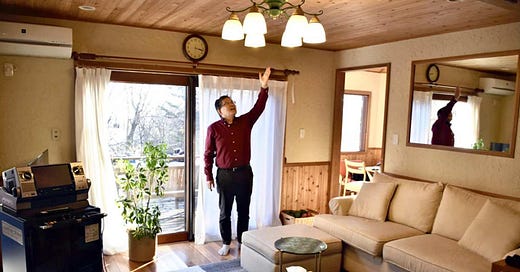By Natsuki Tachino / Yomiuri Shimbun Staff Writer
14:21 JST, January 23, 2025
UTSUNOMIYA — Minpaku private lodging services using vacant houses (akiya) and vacation homes have expanded in Tochigi Prefecture, their numbers more than tripling from five years ago.
The number of minpaku lodgings reported under the Private Lodging Business Law had reached 359 as of the end of fiscal 2023.
The increase can be attributed to growing awareness of minpaku services, as well as the growing demand from inbound tourists, partly because of the weak yen.
Minpaku services involve renting out vacant rooms in private homes and condominiums to travelers.
While many hotels and inns focus on services such as hot springs and meals, minpaku lodgings usually offer overnight stays without meals, making it easier to keep the room rate low.
Legally, there are three types of minpaku lodging services: facilities based on the Private Lodging Business Law; no-frills lodging houses based on the Hotel Business Law; and special zone private lodgings based on the National Strategic Special Zones Law.
According to the prefectural government, there are no special zone private lodgings in the prefecture, and it is unknown how many minpaku private lodging services have been offered based on the Hotel Business Law.
However, after the Private Lodging Business Law came into effect in 2018, the number of minpaku services being set up under the law has increased over the years, according to the relevant authorities. The number is said to be particularly high in Nasu and Nikko, which are home to major tourist attractions.
90% of users are foreigners
Foreigners are also the main users of minpaku lodgings in Nikko, which attracts many visitors from overseas.
Beer Restaurant Enya, which operates a steakhouse in Nikko, renovated a vacant apartment building next door and opened a minpaku lodging facility called Dragon Inn Nikko in August last year.
The facility has three types of rooms, each of which can accommodate a maximum of four to six people.
More than 90% of the guests are foreigners, and the rooms were full during the autumn foliage season from October to November last year.
To allow foreign guests to experience a taste of Japanese culture, the lodgings include tatami mats and shoji screens. However, instead of bathrooms with bathtubs, they have shower rooms, which are more familiar to foreigners.
“We received a better response than we had expected. We would like to increase the number of minpaku lodgings in the future,” Enya’s President Hajime Takamidori said.
Intense competition
The sudden increase in the number of minpaku lodgings has intensified competition among them.
The Nasu Grand Lodge is a minpaku facility located in the mountains of Nasu. The facility, a single wooden building which blends in with the surrounding trees, is equipped with karaoke machines and a barbecue deck.
“Competition in the minpaku services business has intensified in this town as well,” said Hiroaki Shishido, representative of Higashinihon Heiwa Co., in Nasushiobara, which manages a total of 36 minpaku lodgings, mainly in Nasu, including this facility.
Nasu, which is close to the Tokyo metropolitan area, has many entertainment facilities such as zoos and amusement parks, so many individuals and companies from outside the prefecture are said to have started operating businesses in the area to take advantage of the strong demand for accommodation.
Construction is underway at the Nasu Grand Lodge to install a sauna.
“We need to differentiate our facility from other minpaku private lodging services by making it distinctive,” Shishido said.





Thank you for sharing this information.
I found the following reference on how to rent out your own property in Japan to be quite useful for this purpose: https://mailmate.jp/blog/minpaku-license-japan
I wonder how long this relatively welcoming environment for would-be property managers will continue in Japan.
In my native U.S., for example, Airbnb seems to be struggling in some cities and towns due to stricter local regulations, homeowner association (HOA) restrictions, and concerns about housing affordability. Many cities, such as New York and Los Angeles, have imposed strict rules on short-term rentals, requiring licenses, limiting rental days, or banning them altogether to address issues such as noise, safety, and housing shortages. HOAs are also restricting the use of Airbnb to maintain community standards and prevent safety hazards. Additionally, the rise of short-term rentals has been linked to increased housing costs as landlords prioritize tourists over long-term tenants. In response, Airbnb and other vacation rental companies have ramped up lobbying efforts to counter restrictive policies and shape regulations in their favor.
Could something similar happen in Japan?